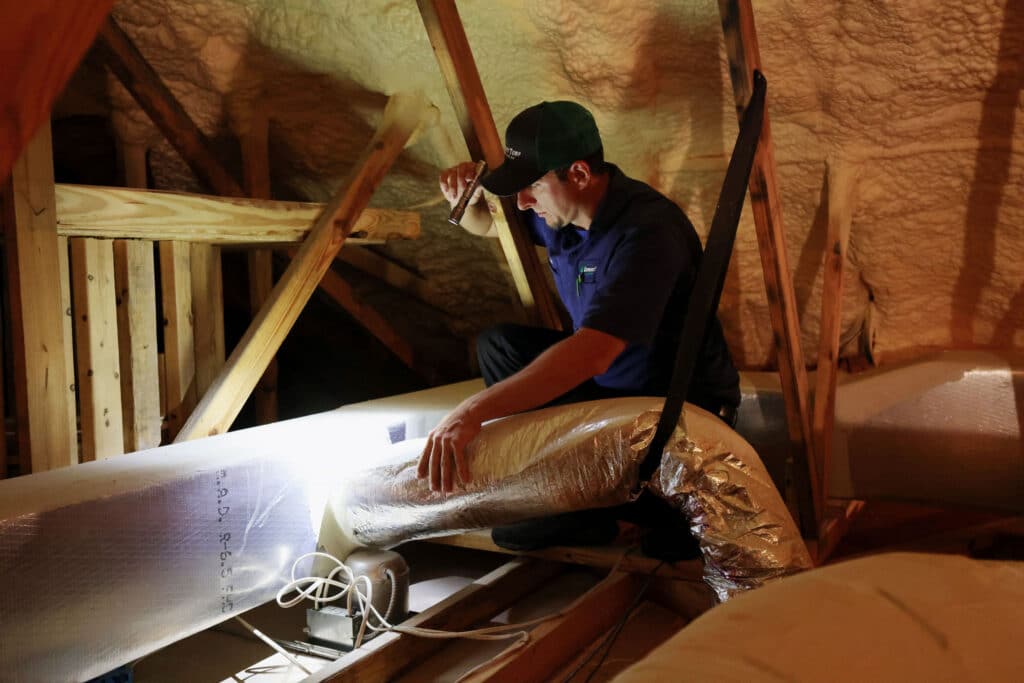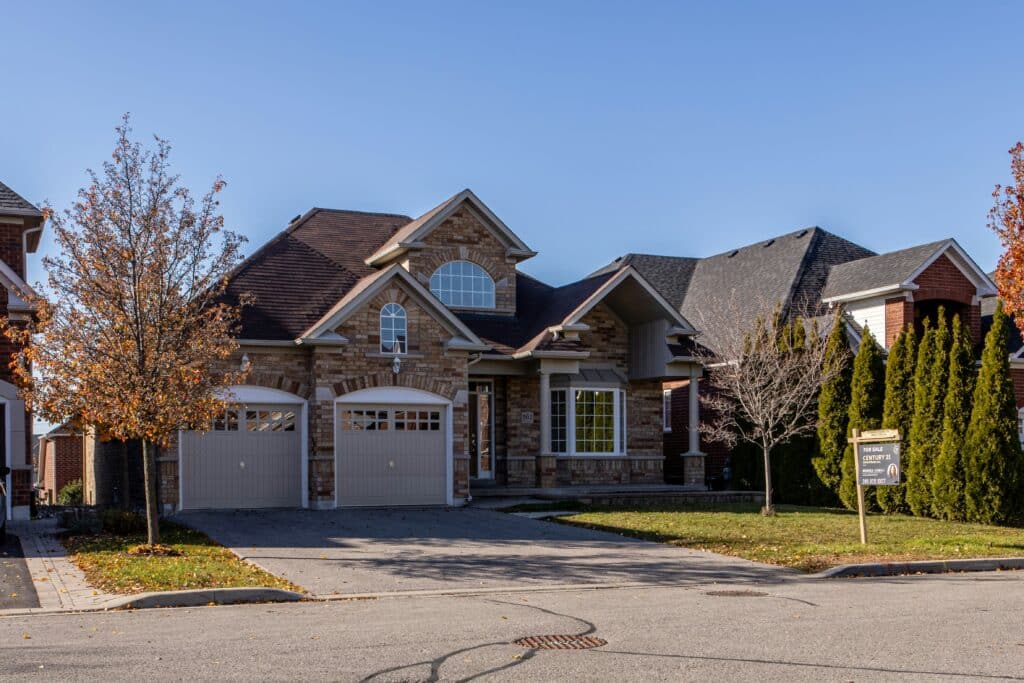Smoke, smog, pollen, and more—it all affects our outdoor air quality. But did you realize that your indoor air quality could be even worse? In this article, we’ll cover some of the common pollutants and solutions that will help you improve your indoor air quality.
Signs You Need to Improve Indoor Air Quality
There are a few key symptoms that may indicate that your indoor air quality could be better. You may experience any combination of the following:
- Itchy or watery eyes
- Runny or stuffy nose
- Sneezing
- Coughing
- Headache
- Scratchy throat
- Fatigue
Common Air Pollutants
The first step to improving your indoor air quality is to understand what are the sources of common air pollutants here in Florida. There are different approaches to tackling each one, so be on the lookout for which one may be in your home.
Volatile Organic Compounds (VOCs)
These are potentially harmful gasses emitted into the air by various products or processes. Sources of VOCs include paint, adhesives, certain cleaning products, and even new furnishings like carpets and composite woods. VOCs aren’t a single harmful chemical, but rather a class of chemicals. This means while some can be fairly serious, others don’t carry significant health risks.
Reducing VOCs can be difficult, but switching to eco-friendly products and restricting harsh chemicals to well-ventilated areas can combat poor indoor air quality.
Dust & Allergens
Sources of allergens include pet dander, pollen, and dust mites that might accumulate in indoor spaces. These can cause people with allergies or asthma to have difficulty breathing or to get irritated, watery eyes, and other symptoms. Keeping the house clean and investing in a good air purifier can reduce indoor allergens.
Mold & Moisture
Poorly ventilated bathrooms and kitchens, leaky pipes, damaged roofs, and even indoor plants can be sources of mold in the home. Spores produced by mold can cause respiratory problems over time, so it’s important to keep on top of mold by removing sources of excess moisture, improving ventilation, and using a dehumidifier where necessary.
Cooking Emissions
Cooking can produce fumes, carbon monoxide, and airborne particulate matter—especially when using a gas stove. You should ensure that your cooking area is well-ventilated and always vent ranges over gas stoves outside.
Maintain Your AC System
With our aggressive pollen season, regular AC maintenance in Gainesville and Jacksonville is a must-have for good indoor air quality. After controlling the sources of air pollutants in your home, your HVAC system is your air quality’s best line of defense. Here are some of the things to take care of routinely.
Change Your Air Filters
Changing your HVAC’s air filters too infrequently can exacerbate your allergies—dirty air filters can accumulate unwanted mold, mildew, and other respiratory irritants. Air filters regularly need to be replaced (about every 1–2 months) to keep your system running smoothly and to reduce energy consumption by up to 15%. Not only that, your air filters trap common household pollutants more effectively when they’re not bogged down—allowing you to breathe easier.
Clean Your Air Ducts
While it’s normal for homes to have a small amount of dust and debris inside the air ducts, a large buildup of dust can affect the performance of the system. This buildup can impact the HVAC system’s ability to filter pollutants effectively. Common allergens—including dust mites, mold, pollen, pet dander, and even cockroach droppings—can build up in your ductwork, causing your HVAC to run inefficiently and circulate unclean air. So it’s a good idea to periodically check to see if they need professional cleaning, especially after storm damage, construction, or a rodent/bug infestation.
If you notice a buildup of dust or debris or a deterioration of the duct seals, it’s best to get in touch with a professional duct cleaning service.
Check Coils, Drains, & Components
Maintaining the health of your overall AC system will help its ability to run efficiently and filter out potentially harmful substances. Leaky parts or ineffective drainage can contribute to household mold and mildew. Some common signs of a failing air conditioning unit include strange noises or smells, the unit running without turning off, increasing energy bills, and ineffective heating and cooling.
We recommend getting your HVAC system seen by a professional at least once per year to ensure everything is working as it should and there are no underlying issues that might negatively affect your home’s air quality. Alternatively, your HVAC technician will be able to tell if it’s time for an upgraded unit to better combat the contaminants that exacerbate allergies.
How to Fix Indoor Air Quality
Ideally, you can prevent—or at least minimize—airborne allergens or irritants from entering your home and becoming a nuisance to your home. If allergens or debris do make their way indoors, it’s time to take defensive action. Here are a few ways you can take control of your air quality.
Improve Your Ventilation
According to the Environmental Protection Agency, the introduction of outdoor air is a key way to reduce or dilute air pollution coming from indoor sources and promote overall air quality. You’ll need to use your best judgment on whether this is the right solution when there are sources of outdoor air pollution such as allergens, smoke, or refuse nearby.
While some HVAC systems can mechanically bring outdoor air into the home, most do not. Instead, look for ways of using natural ventilation to bring in outdoor air. This includes opening doors and windows (weather permitting) and making use of window, attic, bathroom, and kitchen fans.
Allergies or the weather can mean that it’s not always practical to introduce outdoor air into the system. In this case, you might want to invest in an air cleaner, air purifier, or other air quality products to help.
Keep it Clean
Keeping your home clean can go a long way to improving your overall air quality. Here are a few places to focus on when cleaning for air quality:
- Carpets and rugs
- Curtains and drapes
- Soft furnishings
- Forgotten corners and hard-to-reach areas
- Pet beds
Fabric acts as an air filter, trapping particles within its fibers—regularly changing bedding and vacuuming rugs and carpets once or twice a week can be a huge help in reducing dust caught in them. However, low-quality vacuums run the risk of ejecting dust mites, pet hair, and other allergy triggers back into the air. Look for vacuums that are certified to prevent allergies from reentering your air supply.
Another key factor to improve your air quality is dusting responsibly. To avoid moving dust from an unclean surface and into the air, use a damp or polish-treated cloth. If you are already suffering from allergy-related symptoms, consider leaving the house for a few hours after cleaning to avoid the undesirable effects of unsettled dust.
Lastly, remember that carpets are generally harder to keep clear of pollutants than tile, laminate, or hardwood flooring, so consider how easy a surface is to keep clean during your next home renovation.
Reduce Humidity
Moisture makes it easier for mold to grow inside. Reduce humidity around your bathroom, kitchen, and other rooms with frequent water use using the following approaches:
- Use a dehumidifier, and clean it once a week.
- Fix all leaks and closely monitor other seemingly unexplainable damp areas.
- Install a ventilation system, such as an exhaust fan, to reduce moisture while taking baths or showers.
If you see mold, clean it immediately and repeatedly. Moldy residential and commercial ducts can cause allergy symptoms. Duct cleaning comes with several benefits—with reduced humidity and lower risk of mold exposure being only some of them.
In both coastal Jacksonville and swamp-adjacent Gainesville, reducing humidity requires an active approach. Aim to keep your relative humidity under 50% to minimize allergen exposure.
Use Air Conditioning Strategically
Using air conditioning during hot Florida seasons can help control dust recirculation and reduce humidity. Mayo Clinic recommends maintaining the temperature of your home or office between 68 and 72 degrees Fahrenheit.
Breathe Easier with Comfort Temp
Comfort is our business, and it’s not comfortable to be sneezing or nursing a scratchy throat inside your own home. It’s hard to be at peace when you’re preoccupied with managing allergy and respiratory symptoms—especially when you should be safe inside. Battling a problem as important as indoor air quality requires a comprehensive approach. Take back your wellness and improve indoor air quality with Comfort Temp’s air quality products for both your home and your workplace!

